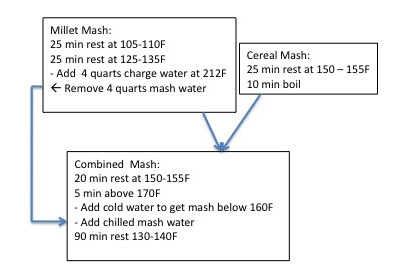Chris, what mash schedule did you use? My wife is very gluten intolerant. She can't even have an Obsession without a mild reaction. So, I've been reading how to do a millet all-grain. (She doesn't like the sorghum beers she's tried.) I've only done 2-3 all-grain batches of regular brew, so I'm a little new to all-grain, and gluten-free all-grain seems to be a whole new skill set.
There are some other posts on here recently that discuss single infusion, which may be the way to go with large batches or when mashing with a more traditional mash tun setup. I have been using a step mash with a parallel cereal mash because I use buckwheat. The procedure description looks complicated but it is really pretty simple, see attached schematic.
Detail of process I used:
Crush millet grain with a 0.010 inch gap and the buckwheat with a 0.045 inch gap.
Treat 10 gallons of water for the mash:
- 4.3 gallons – strike water for main mash
- 1.25 gallons – strike water for cereal grain mash
- 2 gallons – ice bath
- 1 gallon – small pot to boil for decant charge water
- remainder hold in a container in case needed to add water for some reason or for sparge water
Dough in 11.5 lb millet with 17.25 quarts of ~110F strike water in a kettle that can be heated (no bag). [1.5 quarts/lb]
This begins the first 25 min rest of the millet mash.
While the millet mash is in its first rest I begin the cereal mash. Dough in the 2.5 lb of buckwheat corn into 5 quarts ~163F water [2 quarts/lb]. Hold for 15 to 25 minutes. Then boil for 10 minutes stirring constantly.
When the first 25 min rest of the millet mash is over, heat the millet mash to 130F stirring constantly while heating, and then hold for 25 minutes.
When the second rest on the millet mash is complete stir in 4 quarts of boiling water. This is just to add some extra water for collecting enzyme rich mash water and to add some heat. Let the mash settle for a few minutes and then scoop off 4 quarts of water from the top and put in a sealed container like a water jug. This is the enzyme rich mash water that will be added back later. Put the decanted mash water container into the ice bath.
Combine the millet mash with the cereal mash. The mash should be about 155F. Add hot water or cold water as needed to get between 150F and 155F. Hold for 20 min.
Heat the mash to between 170 and 180 for 5 minutes.
Add clear chilled water to the mash first to bring the temperature down below 160F.
Then transfer the mash into the mash cooler lined with the voile bag.
Note: I use two 5 gallon coolers with voile bags so that I can easily lift the grain bags for draining.
Then add the chilled mash water, which should bring the mash down below 140F.
Add more chilled water or hot water as required to start the rest with the mash between 135 and 140F.
Add Diatase Enzyme to the mash. This is probably optional but I think it helps with the conversion.
Hold the final rest for 90 minutes.
At final rest there should be about 1.9 quarts per pound of grain or just over 6.5 gallons of water with the 14 lb of grain.
Heat 1 to 1.5 gallon of sparge water to 170F in boil kettle (this can be the treated mash water or mash water with some distilled water so the sparge water has less mineral content)
Pull grain bag and let it drain some (first runnings).
Teabag sparge the grain bag in the preheated sparge water in the boil kettle.
Pull the grain bag and combine total wart in boil kettle.
It helps to have a boil kettle with volume markings or a calibrated stick to determine the volume of wart collected. Take a gravity reading.
ppg = (gravity points of wart collected)*(gallons of wart collected)/(pounds of grain)
For example with the 14 lb of grain and 7 gallons of 1.047 gravity wart collected I calculated ppg = 47*7/14 = 23.5
The batch plan and boil off is adjusted to hit target OG.
Schematic:




